

4 Questioning Strategies For Effective & Thoughtful Teaching. 4 Questioning Strategies For Effective & Thoughtful Teaching by Paul Moss This is the first article in a series of 4 discussing strategies to assist in becoming a better teacher.
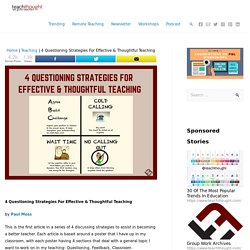
Each article is based around a poster that I have up in my classroom, with each poster having 4 sections that deal with a general topic I want to work on in my teaching: Questioning, Feedback, Classroom expectations, and Listening. Questioning can be an enormously powerful weapon in the teacher’s arsenal, but can be equally as ineffective if not applied with diligence. There are numerous excellent discussions to be found on effective questioning, especially in relation to the types of questions to ask, but I decided to create a visual representation that I could pin up on my wall of what I thought were the cornerstones of effective questioning. 1. 2. The 2nd quadrant is ‘Cold Calling’. 3. Ready Mathematics Classroom Poster. Using Guiding Questions to Probe Student Understanding.
There is a huge shift in mathematics education away from memorizing procedures and toward deeper conceptual understanding.
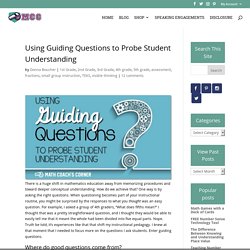
How do we achieve that? One way is by asking the right questions. When questioning becomes part of your instructional routine, you might be surprised by the responses to what you thought was an easy question. For example, I asked a group of 4th graders, “What does fifths mean?” The Q Factor: Adding Quality to Our Questions. One of the neat things about being an educational blogger is that you get to connect with educators across the country and even the world.

This past summer I attended the Teachers Pay Teachers conference in Las Vegas, and I had the extreme pleasure of meeting Greg Coleman, aka Mr. Elementary Math. Naturally, we hit it off, and I knew that collaboration would be in our future. Tonight, I present my very first guest post, written by Greg. There’s even a freebie at the end! This post contains affiliate links, which simply means that when you use my link and purchase a product, I receive a small commission. The Q Factor Do you find yourself asking questions like, “What place does the underlined digit hold in the number 256?” Lately, at the end of a number talk or math task, I've been asking, "Did anyone revise their thinking?
The Types of Questions we Ask: which categories of questions should we focus on? I think we can all agree that there are many different ways for our students to show what they know or understand, and that some problems ask for deeper understanding than others.
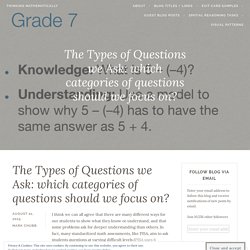
In fact, many standardized math assessments, like PISA, aim to ask students questions at varying difficult levels (PISA uses 6 difficulty levels) to assess the same concept/skill. 100 Questions That Help Students Think About Thinking - 100 Questions That Help Students Think About Thinking by Terry Heick Last year I wrote a post on how to help students think for themselves.

TeachThought reader Peter Duckett wrote me a few months later with these questions below that he added in order to facilitate their use in the classroom. I’ve added some myself, and am going to continue to add more after giving you a chance to do so. In the comments below, suggest a question for one of the categories below and I’ll add them to the list. Leave your twitter username and I’ll credit you next to the question. 50 Questions To Help Students Think About What They Think - TeachThought. Contributed by Lisa Chesser Using the right questions creates powerful, sometimes multiple answers and discussions.

The Question Game: A Playful Way To Teach Critical Thinking. The Question Game by Sophie Wrobel, geist.avesophos.de The Question Game: A Playful Way To Teach Critical Thinking Big idea: Teaching kids to ask smart questions on their own A four-year-old asks on average about 400 questions per day, and an adult hardly asks any.
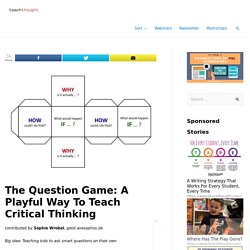
Always-On Inquiry: Why You Should Be Asking More Questions In Your Classroom. Always-On Inquiry: Why You Should Be Asking More Questions In Your Classroom by Irena Nayfeld, TeachThought PD Inquiry Workshop Facilitator Those of us who spend our days around young children hear it all the time: “What’s that?”
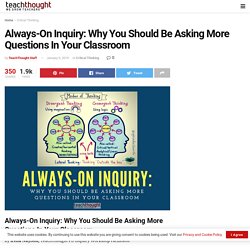
“Why are you doing that?” “How?” “Why?” “HowWhyWhenWhatWhy?” Children are infinitely curious – they want to understand the world around them, how it all works, where it comes from, and how to interact with it. Teachthought. Ready: 100 questions that promote Mathematical Discourse. Early Childhood Math Questioning Strategies. Questioning the pattern of our questions. I find myself spending more and more time trying to get better at two things. Listening and asking the right kinds of questions that will push thinking. While I find that resources have helped me get better at asking the right questions, I have learned that listening is actually quite difficult.
The quote below is something that made me really think and reflect on my own listening skills: Ready 100 math discourse questions graphic 2016 02. Questioning and Vocabulary Supports That Inspire Language-Rich Mathematics. Printable Intuition Questions. 100MathDiscourseQuestions_Printable.pdf. 50 Questions To Help Students Think About What They Think - TeachThought. The Art of Questioning in Mathematics - Robert Kaplinsky.
If you think others need to see this, share it on one of the sites below by clicking on the button.
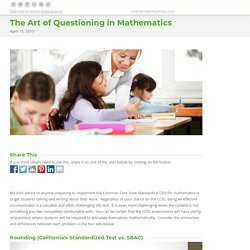
My best advice to anyone preparing to implement the Common Core State Standards (CCSS) for mathematics is to get students talking and writing about their work. Regardless of your stance on the CCSS, being an effective communicator is a valuable and often challenging life skill. It is even more challenging when the content is not something you feel completely comfortable with.
You can be certain that the CCSS assessments will have plenty of questions where students will be required to articulate themselves mathematically. Consider the similarities and differences between each problem in the two sets below. Rounding (California's Standardized Test vs. Comparing Fractions (Arizona's Standardized Test vs. In both questions from the outgoing state assessments, students were asked multiple choice questions where no explanation was required. How to Help Students Ask Better Questions by Creating a Culture of Inquiry. Response: Ways to use Questions Effectively in the Classroom. Response: Ways to use Questions Effectively in the Classroom. Robertkaplinsky. If you think others need to see this, share it on one of the sites below by clicking on the button.
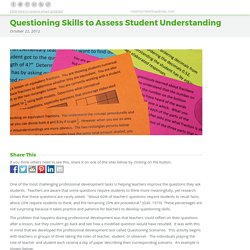
One of the most challenging professional development tasks is helping teachers improve the questions they ask students. Teachers are aware that some questions require students to think more meaningfully, yet research shows that these questions are rarely asked. “About 60% of teachers’ questions require students to recall facts; about 20% require students to think; and the remaining 20% are procedural.” (Gall, 1970) These percentages are not surprising because it takes practice and patience for teachers to develop questioning skills. The problem that happens during professional development was that teachers could reflect on their questions after a lesson, but they couldn’t go back and see how a modified question would have resulted. Teacher You want to find out what answer your student got to the question, “What is the area of a square with a side length of 4?” Student. To question, how to question, that is the question…or something – Teaching to the Beat of a Different Drummer.
Yesterday I read a post called Questions and more questions! On the blog in stillness the dancing. [UPDATE – Beth Ferguson (@algebrasfriend) updated and revised this post in 2016. You can check out the updated version here.] After reading the post, I ended up writing a comment with the thoughts that came to my mind about questioning. 6 Critical Thinking Questions For Any Situation - 6 Critical Thinking Questions For Any Situation by TeachThought Staff While it’s true that critical thinking is a foundation rather than a brick, how you build that foundation depends on the learning process itself: exposing students to new thinking and promoting interaction with that thinking in a gradual release of responsibility approach. The following graphic from learningcommons is most useful for its universal applicability via its simplicity–six basic questions that characterize critical thinking. The questions are general enough that they can be used with almost anything–different age groups, content areas, and various learning contexts.
Whether you’re exploring math theories with a high school classroom, astronomical phenomena in a university, or a picture book in the elementary classroom, the questions can be used with few changes to promote critical thinking. 1. Establish the basics and begin forming questions. 2. Ask yourself why this is or isn’t significant. 3. 4. 5. 6. Open Ended Questions In Teaching. Questioning the pattern of our questions – Thinking Mathematically. Nctm. Why Questions Are More Important Than Answers - TeachThought PD. Questioning the pattern of our questions – Thinking Mathematically. [3958] 6 Myths and Misconceptions About Differentiated Instruction.
100 Questions That Help Students Think About Thinking. 100 Questions That Help Students Think About Thinking by Terry Heick Last year I wrote a post on how to help students think for themselves. TeachThought reader Peter Duckett wrote me a few months later with these questions below that he added in order to facilitate their use in the classroom. I’ve added some myself, and am going to continue to add more after giving you a chance to do so.
In the comments below, suggest a question for one of the categories below and I’ll add them to the list. Leave your twitter username and I’ll credit you next to the question. Let them watch their predictions play out What do you think will happen? Let them form theories, and immediately test and revise those theories based on observation What do you think? Give them the right collaboration with the right “mind” at the right time.